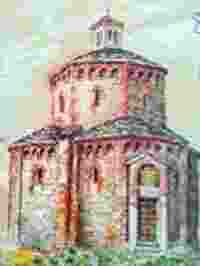Patriarch

Joshua
Son of Nun with the laying on of hands by Moses, he was filled with the spirit of wisdom.
After Moses' death, he admirably led the people of Israel along the Jordan River into the promised land.
Join us
Joshua Patriarch
Joshua lived in the 12th century BC, his name means "God saves". He was born in Egypt at the time of the slavery of the Jews. Son of Nun, of the tribe of Ephraim, he participated in the exit from Egypt of the Jews under the command of Moses. He distinguished himself as a military commander when the Jewish tribes were attacked by the Amalekites at Rephidim. He led the twelve Jewish tribes in the first conquests in the land of Israel, after the exodus from Egypt.
With Moses he went up for a while to Mount Sinai, where Moses received the tablets of the ten commandments. He was one of the twelve explorers that Moses sent to search the land of Canaan: it is from this moment that he took the name of Joshua (formerly it was called Hosea). Only Caleb and Joshua brought encouraging news to their patrol, and they were the only ones of that generation to enter the promised land after the people had wandered for forty years in the wilderness. Moses, before dying, elects Joshua as his successor and instructs him to lead the people to the conquest of the land of Canaan. God encourages Joshua to be strong and to lean on the laws of the Torah to lead the people.
Joshua gets the support of the tribes that had settled east of the Jordan (tribe of Reuben, tribe of Gad and half of the tribe of Manasseh), to help the other tribes to conquer the land.
The first obstacle is the Jordan River itself. Joshua advances the Ark of the Covenant brought by the priests before the people: the river miraculously stops its flow and allows the Israelite conquerors to cross. Joshua erects a twelve-stone monument on the west bank at Galgala. Galgala will be the starting point for all subsequent conquests.
Joshua has all the Jewish men born in the wilderness circumcised, not yet circumcised. So he can celebrate Easter, the commemoration of the exit from Egypt.
The ancient city of Jericho constitutes the first conquest of the Israelites under the command of Joshua. The Bible text relates that the city walls fell after the priests circled the city seven times for seven days, playing the Shofar. The city is razed to the ground and a curse is pronounced against all the inhabitants of Jericho: all the inhabitants are killed, with the exception of the family of Rahab, a prostitute who had hosted Jewish spies.
The conquest of Canaan, the crossing of the Jordan and the fall of Jericho, as well as the victory of Ai are described as works of Yahweh: when Israel remains faithful to the covenant, He fights and wins for him.
The decisive help of Yahweh is also emphasized during the battle of Gibeon. Israel faces a mighty army. The Canaanites have teamed up with other peoples to oppose Israel. But Israel still wins. God disrupts the enemy army with a hail of exceptional violence. However, the battle is not over: even if the enemy is on the run, with the favor of darkness the army of the coalitioned peoples could reorganize. Then Joshua, in a shrill voice, orders the sun: "O sun, stop on Gibeon!" And the sun stops. Joshua has plenty of time to wipe out the enemy army. The Bible, reporting this episode, simply intends to affirm that God, and God alone, is the architect of the victory of Gibeon.
After the battle of Gibeon, nearly all of the fortified cities of the Canaanites surrender or fall into the hands of the Israelites. The twelve tribes now have enough space to settle permanently in the promised land. Joshua divides the occupied land among the twelve tribes of Israel. East of the Jordan the tribes of Gad and Reuben settle. Then, starting from north to south, the tribes of Dan, Naphtali, Asher, Zebulun, Issachar, Ephraim, Benjamin, Judah and Simeon settle. The Ark of the Covenant is transported from Guilgal, where it was located after the crossing of the Jordan, to Silo: it will then be moved to Jerusalem by King David.
Joshua gathers the tribes of Israel to the city of Shechem. Before the assembled people, he delivers a memorable speech. He summarizes the extraordinary works done by Jehovah for his people and then exhorts the people themselves to serve their God faithfully, to choose whether to serve "the God of our fathers or the foreign gods of this land".
Joshua died at the age of one hundred and ten and was buried in the Arab city of Kifl Haris, while the tomb of Joseph and that of Eleazar are located respectively in the vicinity of Nablus (ancient Shechem) and Awarta, a few kilometers to the southeast.
